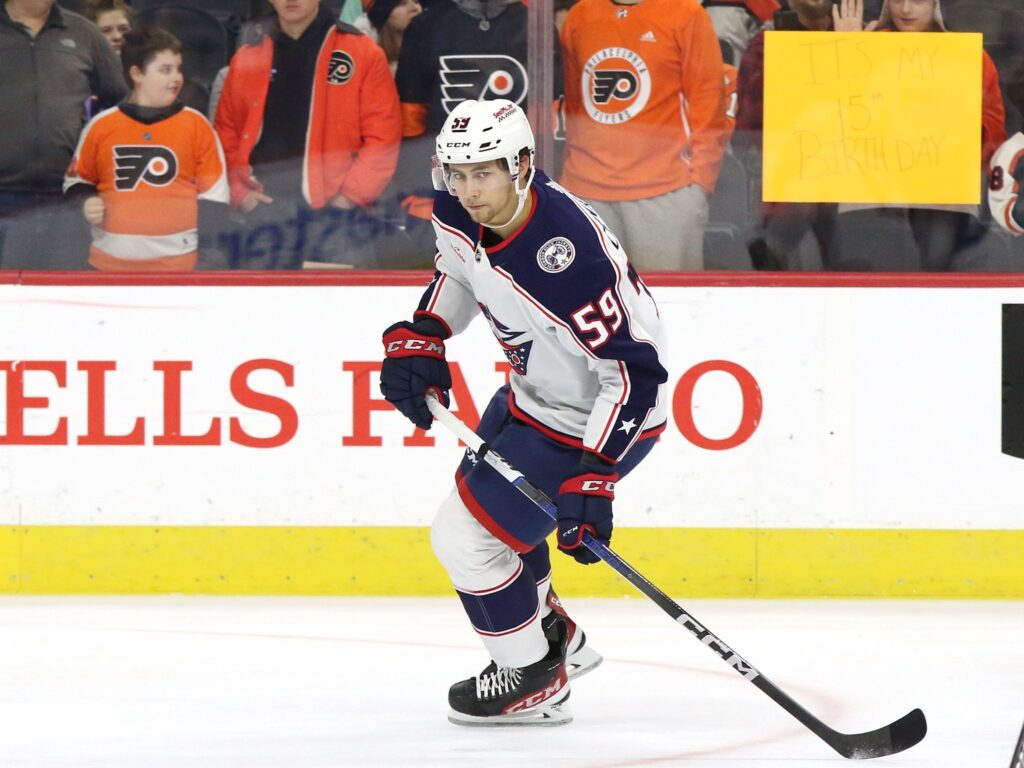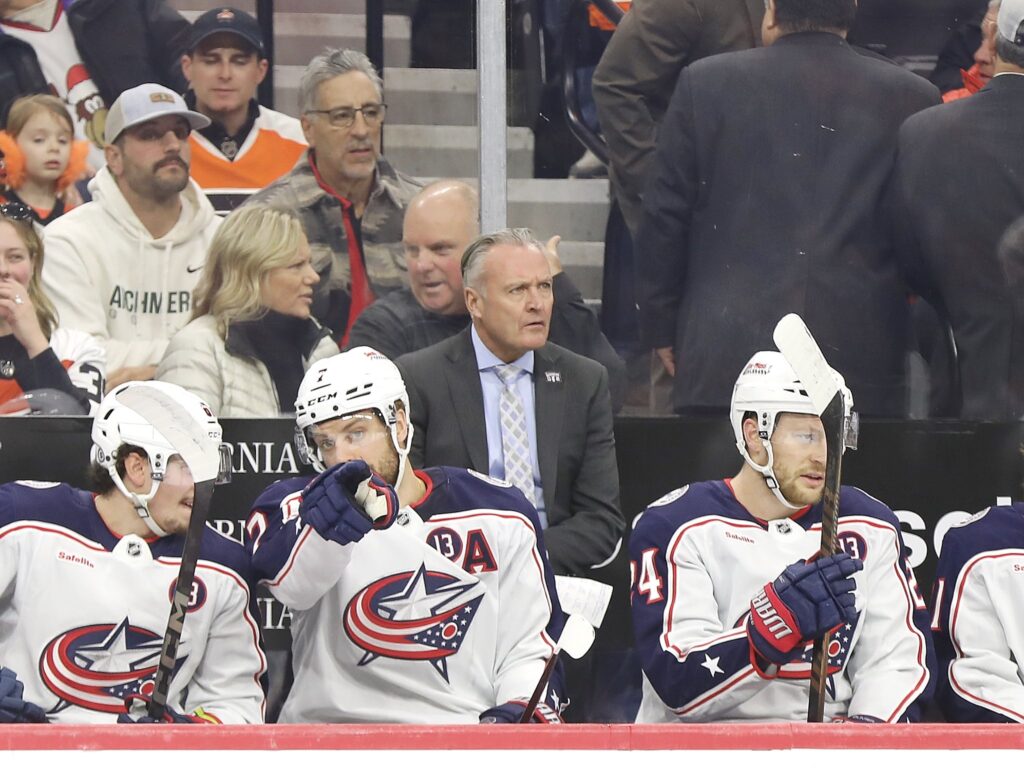In the economy of the NHL, few assets are more volatile—or more tantalizing—than a young, cost-controlled former first-round pick who has already demonstrated scoring touch but finds himself squarely in the coach’s doghouse.
Enter Yegor Chinakhov.
The 24-year-old Columbus Blue Jackets winger is currently the subject of intense trade speculation across the league, representing a fascinating case study in asset management, coaching philosophy, and the difference between a player’s potential and his deployment. Despite a 16-goal performance last season, Chinakhov is on the outside looking in, and rival general managers are circling.

But as teams like the Toronto Maple Leafs have already discovered, prying him loose from GM Don Waddell will be far from simple.
The Root of the Discontent
To understand why a player who posted 29 points in just 53 games last season is available, one must look at the disconnect between the player and the bench. The friction reportedly stems from “misunderstandings” with new head coach Dean Evason.
After a productive 2023-24 campaign, Chinakhov, the 21st overall pick in 2020, was inexplicably benched for the latter half of the season. That trend has spilled into the new year. Through the team’s early games, Chinakhov has been a healthy scratch or, when he does dress, relegated to the fourth line. In the three games he has played, he is averaging a meager 8:47 of ice time—hardly the deployment one expects for a player expected to be a key part of the offensive solution.
This frustration led to a public trade request in July, issued through his agent, Shumi Babaev. While one report suggested Chinakhov later walked back that formal request after a conversation with Evason, the facts on the ice remain unchanged. His usage has not improved, and the fundamental issue—a skilled winger with a heavy shot being used as a spare part—persists.

This leaves Columbus in a difficult position. They have a distressed asset, but one whose value on the open market may be significantly higher than his value to their current coaching staff.
Waddell’s Mandate: This Is a “Hockey Deal”
If teams are expecting a salary dump or a reclamation project for the price of a mid-round pick, they have misread the situation. Don Waddell has been unequivocal: he will not trade Chinakhov simply to accommodate a disgruntled player.
The Blue Jackets are demanding a “hockey deal”—a trade that brings back immediate, tangible value. From the organization’s perspective, they are “one injury away in their top nine from needing him in a more meaningful way.” They know what they have: a 6-foot-1, 200-pound winger with a rocket of a shot who is just entering his prime.
Furthermore, Chinakhov’s contract status gives Columbus all the leverage. He is in the final year of a deal carrying a highly manageable $2.1 million cap hit. Upon expiry, he will become a Restricted Free Agent (RFA), meaning his rights remain under team control. Any acquiring team would not be gambling on a one-year rental; they would be acquiring a controllable asset they can re-sign or take to arbitration.
This combination of proven (if inconsistent) production, ideal size, and contractual control is why Waddell’s phone is ringing, and it’s also why he’s in no hurry to accept the first offer that comes across his desk.
Previously on the EDGE – Metropolitan Mayhem: A Division of NHL Contenders, Pretenders, and Pain
The Failed Robertson Pitch: A Tale of Two Wingers
We already have a concrete example of Waddell’s high asking price, courtesy of the Toronto Maple Leafs. Sources confirm the Maple Leafs, desperate to rebalance their forward corps after the departure of Mitch Marner, attempted to acquire Chinakhov over the summer.
The offer: a straight-up, one-for-one swap for fellow winger Nicholas Robertson.

It was a logical attempt by Toronto. Robertson, himself a former high draft pick, is also a young forward looking for a consistent opportunity. The Blue Jackets, however, promptly rejected the pitch, deeming it “not to their liking.”
A closer look at the two players justifies Columbus’s refusal. While both have struggled with consistency and deployment, Chinakhov’s profile is simply stronger.
- Production: Chinakhov’s career totals (34 goals, 72 points in 178 games) and peak season (29 points in 53 games) both outpace Robertson’s (57 points in 163 games; peak of 27 points in 56 games).
- Size & Style: This is the significant differentiator. At 6-foot-1 and 200 pounds, Chinakhov possesses the physical frame to protect the puck, win board battles, and create space. Robertson, at 5-foot-9 and 180 pounds, is a different stylistic player. Chinakhov’s ability to win space is a coveted commodity.
The consensus around the league is that the value was imbalanced. For a Chinakhov-Robertson deal to work, Toronto would have likely needed to include an additional incentive, a “sweetener” that they were evidently unwilling to add. The talks stalled, but Toronto’s interest remains.
The Scouting Frenzy and the Atlantic Division Arms Raceflame
The Maple Leafs are far from the only interested party. The market for Chinakhov is robust. A recent game between the Blue Jackets and the Colorado Avalanche reportedly drew scouts from as many as 26 different NHL clubs, many of whom were there specifically to get a look at the Russian winger.
The list of teams that have “checked in” reads like a who’s who of the Eastern Conference, particularly the Atlantic Division. Besides Toronto, the Detroit Red Wings, Florida Panthers, and Buffalo Sabres have all made calls. The Calgary Flames are also believed to be in the mix.

For a team like Toronto, the fit is obvious. They need to find scoring depth to support their superstars. Chinakhov is seen as a “perfect landing spot” and a “sneaky addition” who could slot into the top-six. He has the shot to complement a playmaker like John Tavares on the second line or the size and offensive instincts to potentially create a balanced top line with Auston Matthews and William Nylander.
The situation is now a standoff. Chinakhov remains in Columbus, practicing with the team but stuck in deployment limbo. Coach Evason has a player he seemingly doesn’t trust, while GM Waddell has an asset he refuses to sell low.
With a $2.1 million cap hit and RFA status looming, Chinakhov is one of the most intriguing trade chips on the board. The 26 scouting delegations confirm it. A move feels inevitable, but it will happen on Waddell’s terms, not as a fire sale.
Created with the aid of Gemini AI
